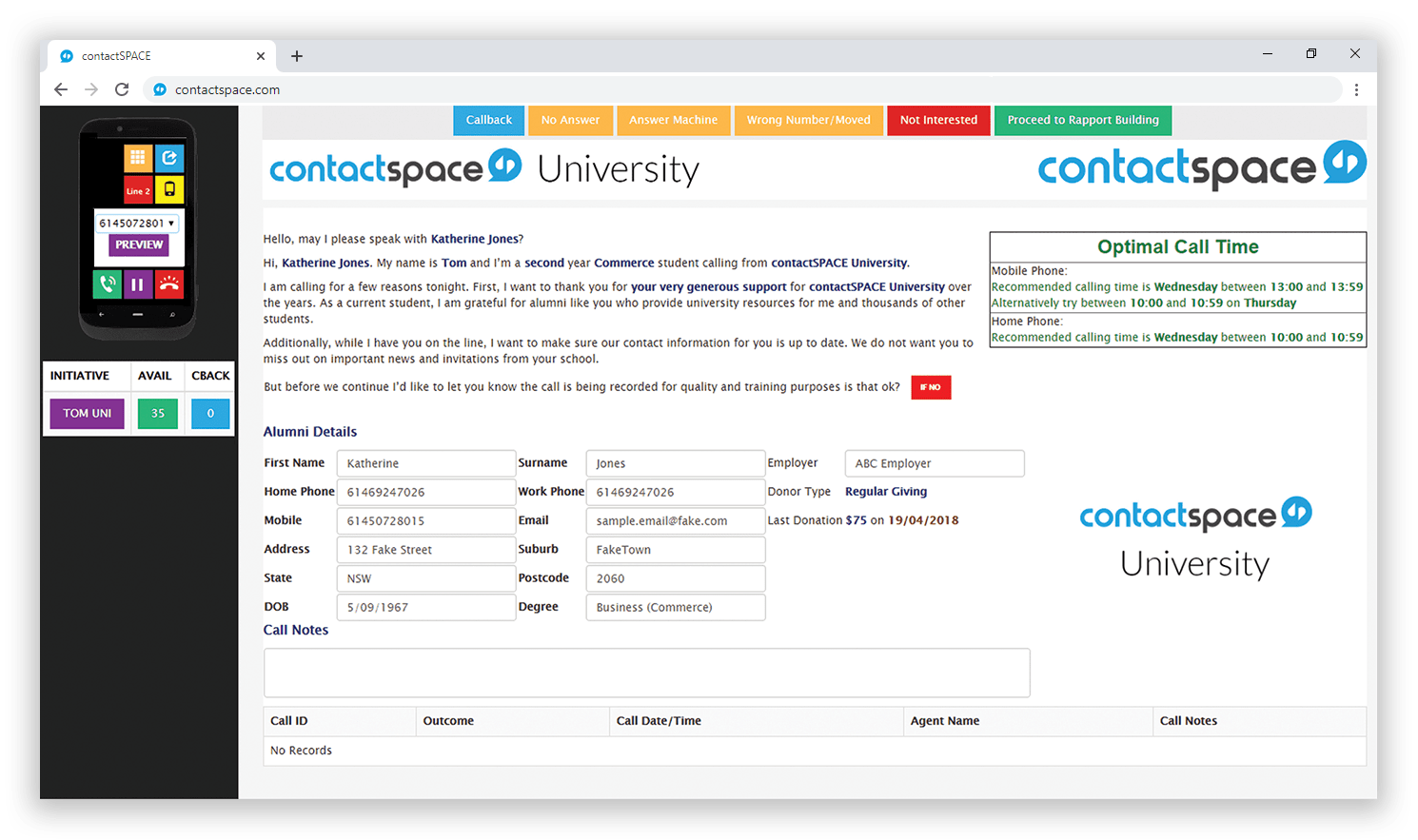To make your offer stand out from the crowd, you need to go above and beyond the status quo with your selling efforts.
COVID-19 has made the sales environment more competitive than ever. But with change, comes opportunity. Your job now is to refine your sales edge, and help your team be as successful as humanly possible.
Here are some strategies you can use to improve outbound sales performance – with both B2C and B2B selling.
1. Create clearly-defined sales goals

Make sure that you have a clear goal in mind for each and every sales call. Do you want to improve product awareness, book an appointment, or make a final sale?
By analysing your performance on a regular basis you can tailor your sales call strategy to meet your targets.
Key performance indicators (KPIs) are the industry standard when it comes to objectively measuring the success of your outbound calls. You can easily tidy up your KPI analysis by concentrating on the ones that really matter for telephone sales, these include:
Conversion rate
The number of sales vs the number of outbound calls is essentially the conversion rate. It can relay to you how well your team is closing sales and a low conversion rate is a sure sign that improvements need to be made.
A falling conversion rate could signal a number of different issues. Conversion rates can be affected by everything from your data quality to the state of the economy.
You might find conversion rate analysis useful when testing out different tactics, such as modifying your ask. This way, you have something specific to tie your conversion rate changes to.
Contacts per hour
In some cases, conversion rates on their own might not tell the whole story. For example, you might be looking to book appointments rather than make the final sale over the phone.
The other issue with conversion rates is they can be misleading when measuring performance over time. Making one sale and making a hundred sales in a week can have the same conversion rate, depending on the number of calls made.
Contacts per hour essentially measures the number of connections made over time. Obviously, getting in contact isn’t as important as making a sale. However, contacts per hour helps you keep on top of how efficiently you’re getting in touch with the right people. If it drops, you might need to look at your data quality, or think about your dialling strategy.
First call close rate
This metric is similar to a conversion rate, but is more useful in helping you measure the quality of your messaging. The better your pitch, the easier your team should find it to close sales with fewer calls.
If your sales efforts normally involve multiple interactions before a deal is closed, you might like to make this “first call booking rate”. Or you could measure the percentage of sales that are closed in less than X calls.
2. Develop a gatekeeper strategy

How your sales representatives deal with gatekeepers can make or break the success of your outbound sales calls. Your team needs to view them as human beings instead of inconvenient impediments to the sales process.
If you’ve been doing B2B prospecting during COVID-19 lockdowns, you might notice that gatekeepers are defaulting to asking for an email, with everyone working from home. Therefore it’s now more important than ever to have a gatekeeper strategy.
There are some really simple things you can do to help keep gatekeepers on your team. Be friendly but confident, address them by their first name, and don’t waste gatekeepers’ time by trying to sell to them.
Another important point to note: most companies’ receptionists will typically cover the normal working hours of the day, but the decision-maker will sometimes be available before or after hours. If you really need to avoid the gatekeeper, and can’t get a direct number for your prospect, you could try calling just outside of regular business hours to reach your target.
3. Avoid premature pitching

A sales representative may unfortunately fall into the habit of pitching too early during an outbound call. This is something you should discourage your staff from doing, as they should be spending the opening part of their conversations focusing on building rapport.
By reinforcing this principle, you will find that less time is wasted and more prospective leads are turned into sales for your company.
For sales teams, having the right information on-hand to help build rapport can be a massive advantage.
Here at contactSPACE, we built something called a CallGuide to make this easy for your team.

As they make the call, agents are equipped with the exact information they need to engage the individual prospect. And as they call progresses, they can progress the CallGuide to update the information displayed – for example to handle objections.
Learn more about contactSPACE CallGuides.
4. Don’t bad mouth competitors

It’s generally a good idea to avoid talking negatively about competitors on the phone, because it can leave the prospect with a lasting negative impression of your brand.
How so? Well, believe it or not, but this is actually referred to as spontaneous trait transference – according to the theory, if you refer to something as a negative, your prospect views the same characteristics in you.
The alternative? Mention the major advantages of your products and services, and how you can solve the prospect’s problems. If a competitor is referenced, remain neutral, and steer the conversation back towards showcasing what your product can do for the prospect.
5. Limit available options

“Analysis paralysis” is a term used to describe a situation where prospects are given too much choice, to the extent that making a decision becomes difficult.
To improve your outbound call success, get your team to offer as few options as possible. This will enable prospects to justify and feel confident in their decision as you are essentially only providing them with the details that are absolutely required.
For example, if your product or service is convoluted, simply concentrate on the main features as opposed to trying to explain them all.
But how do you choose what to focus on? Simple: focus on what will help that specific prospect.
6. Re-think the script

Being under pressure isn’t always the best place to be, that’s why scripts can be really helpful in reducing stress and anxiety. They also help agents have easy access to key details and limit the number of mistakes they make, ensuring outbound calls remain consistent.
Yet, the reality is that scripts may also be hindering your success. Forced or robotic-sounding scripts can be a real turn-off.
So should you completely chuck out your scripts?
If you feel that your staff genuinely benefit from having access to a template, allowing them to feel more confident and at ease, then ensure the script you use is as flexible as possible. The best script is one that supports your staff, but also doesn’t make them sound robotic or fake.
Read our article on the future of cold call scripting, and how contactSPACE CallGuides help you build a messaging framework to help your agents deliver better interactions.
7. Provide quality training

Even the most experienced agents should be offered the opportunity to develop their skills. Aptitude in lead generation is paramount to the success of your sales endeavours.
Any member of staff who is dealing regularly with outbound calls should have access to training which will equip them to deal with the more demanding sales situations which can crop up without warning, as well as to improve on their existing lead generation knowledge.
For example, if your business makes outbound calls to businesses, then training in B2B lead generation will ultimately generate more leads for your sales team.
Depending on your product and the types of calls you make, you might like to run workshops on:
- Managing gatekeepers
- Building rapport
- Demonstrating value
- Handling objections
- Creating urgency
Read our complete call centre training guide to learn more, including how to set up mentoring, and some one-on-one training activities you can use to improve your team’s performance.
8. Improve your recruitment process

It turns out that ploughing through mountains of CVs and finally inviting a select few candidates for an interview may not be the best way to determine who the right fit for the job is.
There’s nothing wrong with having specific and unwavering criteria when it comes to your candidates. This way, you can avoid having to spend so much time looking through resumes that don’t fit the bill.
When asking candidates about their experience, make it clear what kind of experience you are looking for. For example, do you require them to have experience with account-based sales specifically?
Once you have a pool of applicants that look like a good fit, you can have them do a mock sales presentation as an easy way of testing their skills.
Remember, the quality of the presentation they make, and how well they sell, aren’t the only important factors. You’re also looking for a willingness to learn, because chances are, new sales reps will have to learn a bit about your product and your sales process to do well with your team.
9. Make sales a team effort

Since turning leads into sales depends on your employees’ ability to make your customers feel valued and important, don’t forget to make each member of your company feel valued as well.
A relatively easy way of doing this is to use training workshops, as we discussed above. By holding these workshops, you’re signalling that your sales team is important, and that you value their success.
Encourage more experienced team members to support newer ones, but reinforce the idea that everyone is a valuable member of the team.
Technology can also play a role in creating a stronger team atmosphere. The easier it is for a new agent to be successful quickly, the more they’ll feel like part of the team.
10. Encourage and empower your agents

Although you want to provide your staff with the tools and information they need to achieve great sales results, you also don’t want to make them feel like they can’t make their own decisions or trust their instinct when it comes to each individual prospect.
Don’t make your agents feel like they have to have your approval for even the smallest deviation from standard policy. Show them that you trust them by letting reps learn and improve on their own, as well as providing them with the resources they need to do so.
Finally, never underestimate the emotional power of encouragement. If your employees feel appreciated and valued, they are more likely to work harder and enjoy what they do. Happy, satisfied staff can help you achieve better sales results.
